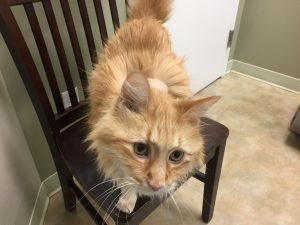 Whatever god there be—or spirit, or entity, or faceless multinational or computer program—or is it Robert Heinlein’s Time Corps that watches over little orange tabby cats?
Whatever god there be—or spirit, or entity, or faceless multinational or computer program—or is it Robert Heinlein’s Time Corps that watches over little orange tabby cats?
All I can say is “Thank you.”
This is the day he wasn’t supposed to be here, and he’s sitting on the bed with his feet propped on my leg. His fur is soft again, instead of matted. His eyes are no longer sunken into his head. He runs instead of walking. He jumps instead of waiting to be placed on a chair or bed.
I took Lazarus for his appointment with Dr. Ward at 3:40. He was annoyed to be back in the carrier, and happy to be let out when we were taken to the treatment room.
As he strode out of the monstrous cage, the staff-member who took his vitals said, “There’s our little walking miracle.” She smiled at me. “I’ve heard all about him.” She said to Lazarus, “You’re a celebrity around here.” He thanked her, and allowed himself to be assisted onto the table. “Megan is probably going to come in to visit,” we were told. “She worked with Lazarus Saturday, and she claimed this appointment; but she got stuck with another patient.” Lazarus modestly did not respond. He’s used to people competing for his attention.
Lazarus was carried to the back for a blood-draw. When he returned, he was wrapped in a leopard-print blanket. A little tacky for my dignified lord of the manor, I thought. “He is feeling better!” his bearer said. “He let us know what he thought of having blood drawn!”
I said I hoped he hadn’t bitten anyone, and then I reached out to comfort my flustered cohort.
He growled. He kept growling for about ten minutes, sounding like a mountain lion, or the giant cat who stalked Captain Kirk in the Hallowe’en episode of Star Trek. He was not happy.
Dr. Ward came in and said, “Hey, tough guy! You’re not letting anybody push you around, are you?”
And then she told me what was going on. Lazarus had had a “firestorm” attack of pancreatitis, a nasty disease which kills cats, dogs, and people. He was damned lucky that someone noticed his change in behavior right away and brought him in for treatment. But now he’d turned a corner.
I almost didn’t dare ask the question. “So… he doesn’t have cancer?”
“I don’t think so,” said Dr. Ward. “Of course, we don’t know what else may be going on. In 29 years of practice, I’ve never seen pancreatitis cause a patient to bleed into his abdomen. But then we don’t take an ultrasound every time.”
“Saturday night, we thought he was dying.”
She confirmed that Saturday night, he was dying. And that the young ER vet with whom we’d consulted, Dr. Hutt, who was compassionate, intelligent, and everything you want in your ER doctor, had not been any more sure than I was what we should do next. But Dr. Ward said, “Always, you treat what you can treat. We couldn’t treat bleeding, or a tumor that wasn’t visible, but we could treat pancreatitis, and that’s what we did.” She added, “We needed to see what this guy had left, and he told us.”
By now, Lazarus had stopped growling, and was listening closely, having helped himself to the visitor chair next to mine.
He may be on steroids for the rest of his life. He needs to eat a prescription diet. But he doesn’t need cancer meds, or exploratory surgery.
I finally let myself believe those three words: It’s not cancer.
He’s been very sick. Is he well? Certainly not completely. How long will he live? We don’t know. Still, I have to say, I gave my little friend the right name all those years ago.
The thing that gives life its value, they say, is that one day each life must end. The miracle of life? I’m pretty sure that happens every time today is not that day.
Peace,
Lazarus, Steve, Renee, Ethan, Christian, Jessica, Oreo, Kirby and Milo.

So happy to hear the good news! I know how much we love our fur babies. Just cherish and savor every day ,and know that whatever happens–or when– that you have given Lazarus a wonderful,love-filled life.